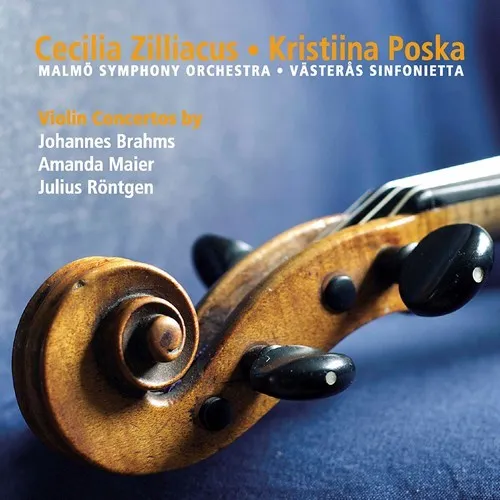
Brahms • Maier • Röntgen Violin Concertos Cecilia Zilliacus (violin); Malmö Symphony Orchestra; Västeräs Sinfonietta/Kristiina Poska db Productions db CD 202 79:05 mins
I suspect the main points of interest for readers here are the concertos by Amanda Maier (1853-94) and her husband Julius Röntgen (1855-1932). Maier was by all accounts a gifted violinist (she played the Brahms Concerto) as well as a talented composer – she studied with Röntgen’s father Engelbert and married Julius in 1880. Both moved in the same musical circle as Brahms for a time, along with the likes of Clara Schumann, Joseph Joachim and Julius Klengel (composer of the iconic 12-cello classic, Hymnus). Tantalisingly, all that survives of Maier’s concerto is a 17-minute opening movement, which fascinatingly sounds like a musical missing link between the Schumann Concerto (also in D minor) and the Brahms.
Swedish virtuoso Cecilia Zilliacus, whom seasoned collectors will know from her fine recordings of the Nielsen Concerto and other works by Maier (also for dB), produces a pure, sweet sound, ideal for the score’s moments of lyrical repose, and the tricky cadenza which she shapes with a soaring eloquence reminiscent of gifted Szeryng pupil, Susanne Lautenbacher. Zilliacus proves no less persuasive in Röntgen’s three-movement F sharp minor Concerto, composed in 1931, shortly before his death the following year. Sounding for all the world like a work from half-a-century before, shades of Dvořák shade the predominately Brahmsian landscape.
Not surprisingly, Zilliacus sounds equally at home in the Brahms Concerto, especially in the ravishing central movement. In all three works she receives engagingly sympathetic support from Kristiina Poska, who brings even the most generic of orchestral gestures sparklingly to life.
Julian Haylock
More reviews
The 20th Century Concerto Grosso
Mozart: Clarinet Concerto & Kegelstatt Trio